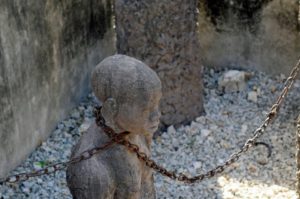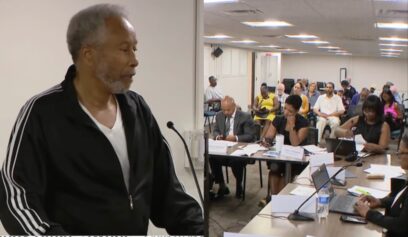
Stone Town Slave Trade 5 | by Son of Groucho (Wikipedia)
By no means a new concept, the issue of reparations for slavery is back in the news and gaining attention. The argument that America owes a debt to Black people for hundreds of years of enslavement — followed by years of Jim Crow segregation and the current, persistent institutional racism — goes to the heart of the nation’s founding. Reparations is the movement to seek redress for America’s original sin and the years of Black free labor, pain and suffering that built the world’s greatest empire, amassed corporate wealth and created intergenerational white wealth.
As we Black Americans find ourselves at a crossroads — with viral “whitelash” on the ascendancy, a heightened assault on our rights and no longer having a Black president to mask the lack of progress — now is an opportune time to push the issue in the public conscience. As society remains clueless about the debt it owes, and with white folks as a whole in denial about racism in general, the idea of reparations needs to be put in their faces, like a drumbeat, each and every day. For a Black community that is increasingly politically conscious and searching for a cause to champion, what have we got to lose?
Michael Eric Dyson, professor of sociology at Georgetown University and author of the forthcoming book, “Tears We Cannot Stop: A Sermon to White America,” has an answer to those empathetic whites who want to help Black causes. He suggests that white people maintain an individual reparations account to donate to Black organizations in an effort to atone for slavery and racism. “That is what I meant by an I.R.A. — an individual reparations account,” Dyson told The New York Times. “You ain’t got to ask the government, you don’t have to ask your local politician. This is what you — an individual, conscientious, ‘woke’ citizen — can do.”
Others have tackled reparations in an effort to move the issue forward. In his 2000 book, “The Debt: What America Owes to Blacks,” Randall Robinson argued that America’s racial problems cannot be solved until the nation compensates Black people for the “grievous wrong that has been committed against African-Americans and takes steps to redress that wrong.” Robinson noted that Black forced labor cleared the land for the District of Columbia. The U.S. government used 100 slaves to build the Capitol, paying slave masters $5 per month for each slave they lent out to Uncle Sam.
Meanwhile, in 1865, after the end of the Civil War, Union General William T. Sherman issued an order calling for the seizure of 400,000 acres of Confederate property and the allocation of 40 acres of land to each of the formerly enslaved Black people, according to PBS. President Andrew Johnson overturned the order and Black folks never received their proverbial “40 acres and a mule.”
Since 1989, Rep. John Conyers (D-Mich.) has introduced H.R. 40 – which stands for “40 acres and a mule” – a bill that would establish a commission to study the effects of slavery and the possibility of reparations, and make recommendations to Congress on remedies. This legislative session, Conyers has reintroduced the bill, known as The Commission to Study and Develop Reparations Proposals for African Americans Act. In a statement to Atlanta Black Star, Rep. Conyers said that since the bill was first introduced, substantial progress has been made in elevating the issue of reparations on a national level and joining the mainstream international debate.
“This version of H.R. 40 reflects that progress and is designed to serve as the vehicle for continued discussion. While we have focused on the social effects of slavery and segregation, its continuing economic implications remain largely ignored by mainstream analysis,” Conyers said. “With the overcriminalization and policing of Black bodies, a reoccurring issue in African-American communities, I believe this conversation is both relevant and crucial to restoring trust in governmental institutions in many communities. The times and circumstance may change, but the principle problem continues to weigh heavily on this country. A federal commission can help us reach into this dark past and bring us into a brighter future.”
In his seminal 2014 essay in The Atlantic, titled “The Case for Reparations,” Ta-Nehisi Coates focused not merely on enslaved Black people who died a long time ago, but rather living Black people who experience institutional racism in the form of redlining and housing discrimination. “America begins in Black plunder and white democracy, two features that are not contradictory but complementary,” he wrote. “The federal government is premised on equal fealty from all its citizens, who in return are to receive equal treatment. But as late as the mid-20th century, this bargain was not granted to Black people, who repeatedly paid a higher price for citizenship and received less in return.” Coates noted that while plunder was essential to slavery, even a century after the Civil War ended and slavery was abolished, the “quiet, systemic, submerged” plunder continued.
Meanwhile, Coates bemoaned America’s failure to acknowledge the nation has white supremacy as its foundation. The result, he said, is a “sin of national lying” and the “politics of racial evasion” — feel-good diversity programs and anti-poverty programs that ignore the role of racism and do not seek to end white supremacy. “The lie ignores the fact that closing the ‘achievement gap’ will do nothing to close the ‘injury gap,’ in which Black college graduates still suffer higher unemployment rates than white college graduates, and Black job applicants without criminal records enjoy roughly the same chance of getting hired as white applicants with criminal records,” Coates wrote.
The issue of slavery reparations is not solely of concern in the U.S., but rather is a global movement. For example, expressing its concern over the human rights conditions facing African-Americans, a United Nations panel recommended that the U.S. pay reparations to the descendants of the enslaved. Germany is considering paying reparations for its genocide of thousands of Black people in Namibia, the first genocide of the 20th century. And the nations of the Caribbean Community, or CARICOM, are pursuing reparations from Britain, France, the Netherlands and other European countries for native genocide and slavery.
In the coming months and years, the proponents of reparations will continue to build their movement and make their case, and the concept of reparations will seep into the public conscience. Along the way, many critics, including some of African descent, will say that it is impossible, that reparations will never come. And yet, we are reminded that abolitionists were told that the institution of slavery would never end. All movements must start somewhere, and while getting reparations will not be easy, the struggle is necessary in order to come to grips with a horrifying past.


